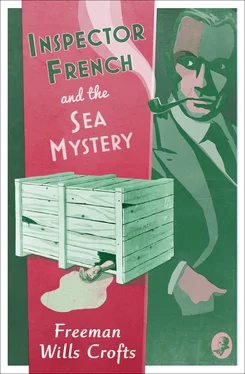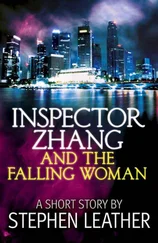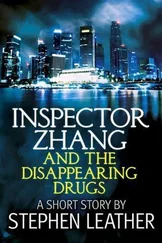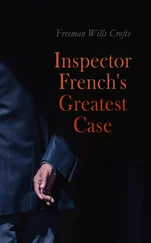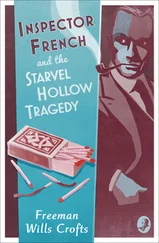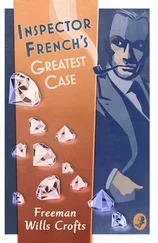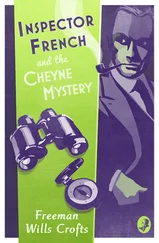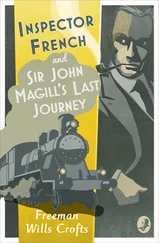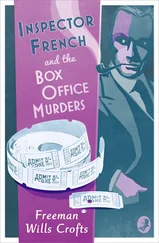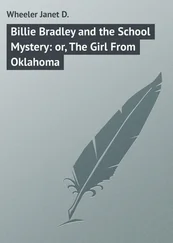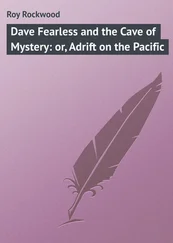But the moment the crate was thrown into the sea, water would begin to run in through the lower holes. French wondered if he could calculate how long it would take to sink.
He was himself rather out of his depth among the unfamiliar figures and formulæ given on the subject. The problem was, how long would it take 579 lbs. of water to run through seven one-sixth inch holes? This, he found, depended on the head, which he could only guess at approximately one foot. He worked for a considerable time, and at last came to the conclusion that it would take slightly over an hour. But that his calculations were correct he would not like to have sworn.
At all events these results were extremely promising, and gave him at least a tentative working theory.
But if the crate had floated from the coast to where it was found, the question immediately arose: At what point had it been thrown in?
Here was a question which could only be answered with the help of local knowledge. French thought that a discussion with the coastguard might suggest ideas. Accordingly he left the hotel and turned towards the harbour with the intention of looking up Manners.
Tom Manners was hoeing in his little garden when French hailed him. He was not a native, but the course of a long career had led him from Shoreditch, via the Royal Navy, to Burry Port. In person he was small, stout, and elderly, but his movements were still alert and his eyes shone with intelligence.
‘I want to have another chat with you about this affair,’ said French, who had already heard the other’s statement. ‘Just walk down to the end of the pier with me while we talk.’
They strolled down past the stumpy lighthouse to where they could get a view of the Inlet.
Again it was a perfect afternoon. The sun, pouring down through a slight haze, put as much warmth as was possible into the somewhat drab colours of the landscape, the steel of the water, the varying browns of the mud and sand, the dingy greys and slate of the town, the greens of the grass and trees on the hills beyond. Some four miles away to the right was the long line of Llanelly, with its chimneys sticking up irregularly like the teeth of a rather badly damaged comb. Fifty-three chimneys, French counted, and he was sure he had not seen anything like all the town contained. Beyond Llanelly the coastline showed as a blur in the haze, but opposite, across the Inlet, lay the great yellow stretch of the Llanrhidian Sands, rising through grey-green dunes to the high ground of the Gower Peninsula.
‘Let us sit down,’ French suggested, when he had assimilated the view. ‘I have come to the conclusion that the crate must have been thrown into the sea at some point along the shore and floated out to where it was found. It would float, I estimate, for about an hour, when enough water would have got in to sink it. Now what I want to know is, where, along the coast, might the crate have been thrown in, so as to reach in an hour the place at which it was found?’
Manners nodded, but did not reply. French unrolled his map and went on: ‘Here is a map of the district, and this is the point at which the crate was found. Let us take the places in turn. If it had been thrown in here at Burry Port, would it have got there in time?’
‘It ain’t just so easy to say,’ Manners declared slowly. ‘It might, if the tide was flowing, and then again it mightn’t. It might ’ave started ’ere or from Pembrey—that’s ’alf a mile over there to the west.’
This was not encouraging, but French tried again.
‘Very well,’ he said. ‘Now what about Llanelly?’
Llanelly, it appeared, was also a doubtful proposition.
‘It’s like this ’ere, Mr French,’ Manners explained. ‘It’s all according to ’ow the tide ’appens to be running. If the tide was flowing and that there crate was dropped in at Llanelly, it would go farther up the Inlet than wot you show on the chart. An’ if the tide was ebbing it would go farther down. But if the tide was on the turn it might go up or down and then come back to the place. You see wot I mean?’
French saw it and he sighed as he saw also that it meant that there was practically no part of the adjacent shores from which the crate might not have come. Then it occurred to him that both his question and Manners’ reply had been based on a misconception.
The murderer’s object was to get rid of the crate. Would he, therefore, choose a rising or half tide which might drift it back inshore? Surely not; he would select one which would take it as far as possible out to sea. French felt that only ebb tides need be considered. He turned again to Manners.
‘I suppose a good ebb develops some strong currents in these channels?’
‘You may say so, Mr French. An average of five knots you may reckon on. A deal faster than you could walk.’
‘Five knots an hour?’
‘No, sir; five knots. It’s like this ’ere. A knot ain’t a distance: it’s a speed. If I say five knots I means five sea miles an hour.’
‘A sea mile is longer than an ordinary one?’
‘That’s right. It varies in different places, but you may take it as 6080 feet ’ere.’
French made a short calculation.
‘That is about five and three-quarter English miles per hour,’ he remarked, as he scaled this distance up the Inlet from the position of the crate. And then his interest quickened suddenly.
A little over five miles from the point at which the crate had sunk the estuary narrowed to less than a quarter of a mile in width. At this point it was crossed by two bridges, carrying respectively the main road and the railway between Swansea and Llanelly. Had the crate been thrown from one of these?
French saw at once that no more suitable place for the purpose could be found. Objects pushed in from the bank would tend to hug the shore and to be caught in backwaters or eddies. Moreover, even if they escaped such traps they would not travel at anything like the maximum speed of the current. But from a bridge they could be dropped into the middle of the stream, where the flow was quickest.
‘What about the bridge up at Loughor?’ he asked. ‘If the crate was dropped off that on an ebb tide, do you think it would get down all right?’
Manners was impressed by the suggestion. Given a good ebb, about an hour should carry the crate to where it was found. French rose with sudden energy.
‘Let’s go and see the place. How soon can we get there?’
By a stroke of luck a train was approaching as they entered the station, and twenty minutes later they reached their destination.
Loughor proved to be a straggling village situated on the left bank of the estuary where the latter made a right-angled bend towards the north. The two bridges ran side by side, and a couple of hundred yards apart. That carrying the road was a fine wide structure of ferro-concrete, fairly new and leading directly into the village. The railway bridge was lower down stream, considerably older and supported on timber piles. Both were about three hundred yards long, and built with short spans and many piers. The tide was out, and the usual wide mud banks were exposed on either shore.
Directly French saw the spot he felt that here indeed was what he sought. On a dark night it would have been easy to drop the crate from the road bridge in absolute secrecy. Nor, as far as he could see from the map, was there any other place from which it could have been done.
He had assumed that the criminal would select an ebb tide for his attempt in order to ensure the crate being carried as far as possible out to sea. For the same reason French believed he would choose the time of its most rapid run. That time must also be in the dead of night to minimise the risk of discovery from passing road traffic. From 2 to 4 a.m. would probably best meet the conditions, as the chances were a thousand to one that the road would then be deserted.
Читать дальше
